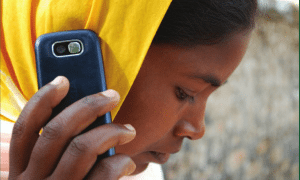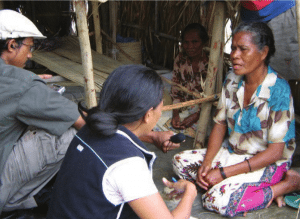 For decades, foundations have poured money into journalism training around the world in the belief that strong, independent news media are a vital component of democracy. And for just as long, those funders have wondered if the investment was worth it. Trainers who spent weeks or months in a country working with local journalists knew they were making a difference–transferring new skills and reinforcing the importance of accuracy and fairness. But success was hard to quantify and even harder to sustain.
For decades, foundations have poured money into journalism training around the world in the belief that strong, independent news media are a vital component of democracy. And for just as long, those funders have wondered if the investment was worth it. Trainers who spent weeks or months in a country working with local journalists knew they were making a difference–transferring new skills and reinforcing the importance of accuracy and fairness. But success was hard to quantify and even harder to sustain.
Now, a new report on one of the biggest international journalism training programs has measured its impact in a different way–by looking at what changed as a result of the journalism being done. The bottom line? Good journalism really does make a difference.
- In Kenya, a series on shoddy care in public hospitals resulted in $7.5 million to improve care
- In Indonesia, a series on medical waste prompted the government to order hospitals to build their own wastewater treatment facilities; and
- In Peru, after crimes by unlicensed cab drivers were exposed, taxis were required to show official identification
These reporting projects and many others grew out of programs run by Knight International Journalism Fellows. They have established new journalism associations, launched journalism schools, created online databases to track corruption, established news delivery services via cell phone and created digital platforms to share content.

The Knight program started more than 15 years ago. For more than a decade, beginning in 1999, I helped to train many of the fellows in training techniques before they headed off on assignment.
Lately, the program has changed its emphasis, bringing in international fellows with strong language skills and requiring them to spend at least a year overseas rather than a few months. Instead of focusing on emerging democracies, the fellows now work in “stable countries with a relatively high level of media freedom.”
Perhaps it’s not surprising, then, that their success has been measurable. But here are a few things that other programs could learn from Knight’s experience.
- Strong journalism skills are not enough to ensure success. The most effective fellows are entrepreneurs with solid management skills needed to lead complex projects in difficult environments.
- High-impact projects need a strong commitment from local partners….By putting their own resources into the project, local partners have a stake in its success.
- Projects focusing on digital journalism are more likely to produce lasting impact. Mobile phones reach many more people in developing countries than other media. Authoritarian regimes tend to regulate traditional media more than the Internet.
While it’s encouraging to read these success stories, it would be a mistake, I think, to believe that only a long-term (and therefore expensive) program can make a real difference. That may be what it takes to seed institutional change, but I’m confident that plenty of international journalism trainers have left a legacy without spending a year or more working on a project. They have encouraged and equipped young journalists around the world to do better work, and it’s been my privilege to help them.









1 Comment
Yeah… well, I’m up to my eyeballs in newspaper stocks. Like that? Get rich or die tryin.